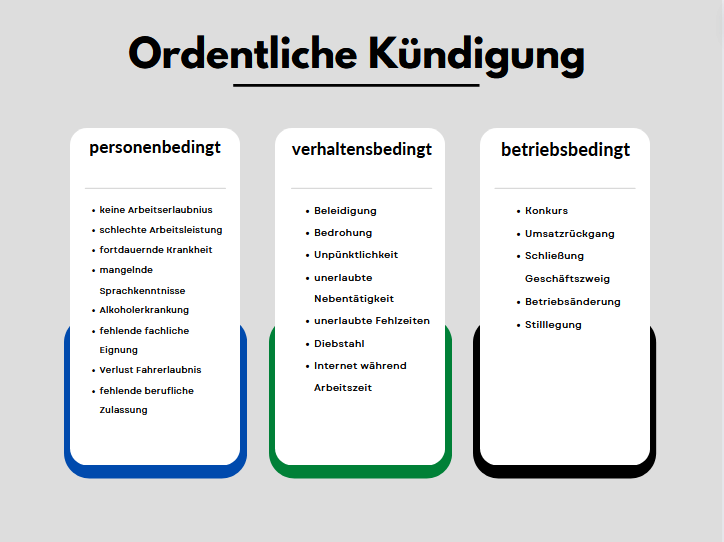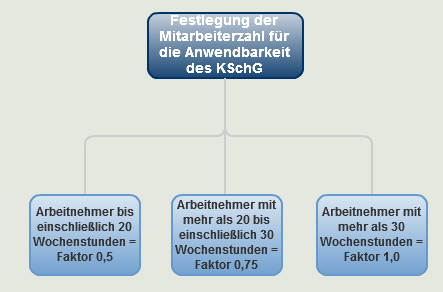The general protection against dismissal under the German Protection against Dismissal Act (KSchG) is regulated in Section 1 KSchG. According to Section 1 KSchG, a dismissal is socially unjustified and therefore invalid if the dismissal of the employee is not justified by reasons relating to the person or behaviour of the employee or due to urgent operational requirements that prevent the continued employment of the employee.
Applicability of the Dismissal Protection Act
For the protection against dismissal under § 1 of the Dismissal Protection Act (KSchG) to take effect, the Dismissal Protection Act must first be applicable.
The scope and applicability of the KSchG follow from §§ 1, 14, and 23 to 25 of the KSchG.
According to this, an employee is protected from an unfair dismissal if:
The employment relationship has existed in the same company or enterprise for more than six months without interruption, and
The company regularly employs more than 10 employees, excluding trainees.
If the employment relationship of the employee existed before December 31, 2003, the Dismissal Protection Act also applies if the company employs more than five employees, excluding trainees, who also belonged to the company as of December 31, 2003.
At first glance, this regulation seems to clearly indicate the applicability of the Dismissal Protection Act.

Proper Determination of the Number of Employees
This means that employees with regular weekly working hours up to:
20 hours are counted with a factor of 0.5,
More than 20 but no more than 30 hours are counted with a factor of 0.75, and
More than 30 hours are counted with a factor of 1.
The following chart illustrates this more clearly:

Further problems regarding the calculation of the number of employees for the applicability of the Dismissal Protection Act may arise from the fact that some employees of the company may not be included in the calculation at all.
This is how trainees become, Managing Director or the company owner are not counted when calculating the number of employees.
The burden of proof as to whether the required number of employees has been reached is graduated according to the case law of the Federal Labour Court (see Federal Labour Court, judgement of 26.06.2008, Ref.: 2 AZR 264/07).
Accordingly, the burden of presentation and proof initially lies with the employee, who must present all known evidence that there is no small business. The employer must then provide a full explanation of the number of employees.
If, even after evidence has been gathered, it is still unclear whether the number of employees required for the applicability of the Dismissal Protection Act has been reached, this doubt is to the detriment of the employee.
Employees Are Also Protected If the Dismissal Protection Act Does Not Apply
Even if the Dismissal Protection Act does not apply, this does not mean that the employee is unprotected against the employer’s behavior.
Where the provisions of the Dismissal Protection Act do not apply, employees are protected by the civil law general clauses (§ 242 of the German Civil Code – BGB) against dismissals that violate good faith or morality.
The principle of good faith (§ 242 BGB) forms an inherent limitation to all rights, legal situations, and legal norms. In such a case, balancing the constitutional rights of contractual freedom (freedom to dismiss) against the rights to dignity and personal development must be considered.
When conducting such an examination, it is important to note that small businesses were deliberately excluded from the Dismissal Protection Act by the legislature.
Thus, an indirect extension of protection against unfair dismissal through general clauses is not possible. A general requirement for just cause in dismissals would be too far-reaching, as this would effectively mean the applicability of the KSchG.
Protection of employees under civil law general clauses, therefore, only applies in exceptional cases:
Dismissal due to a criminal act of the employee, although the employer did not make every reasonable effort to clarify the facts (Federal Labor Court ruling of September 13, 1995, Az.: 2 AZR 587/94).
Dismissal of an employee due to their homosexuality during the probationary period (Federal Labor Court ruling of June 23, 1994, Az.: 2 AZR 617/93).
Dismissal of an employee who has worked for 18 years in a small business and has a family, although two colleagues are significantly younger and have been with the company for a shorter time (Federal Labor Court ruling of February 21, 2001, Az.: 2 AZR 15/00).
Important Note: The content of this article has been prepared to the best of our knowledge and belief. However, due to the complexity and constant evolution of the subject matter, we must exclude liability and warranty. Important Notice: The content of this article has been created to the best of our knowledge and understanding. However, due to the complexity and constant changes in the subject matter, we must exclude any liability and warranty.
If you need legal advice, feel free to call us at 0221 – 80187670 or email us at info@mth-partner.de.

